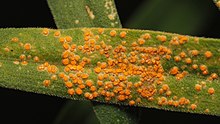Coleosporium asterum is a species of rust fungus[2] in the family Coleosporiaceae.[1] It infects species in the Asteraceae family, such as those in genus Aster and Solidago, as well as the needle pines Pinus contorta and P. banksiana.[2] It has been recorded on aster family species Canadanthus modestus, Eurybia conspicua, Solidago missouriensis, Symphyotrichum ciliolatum, S. laeve,[3] and numerous others.[4]
| Coleosporium asterum | |
|---|---|

| |
| On a leaf of a plant in family Asteraceae | |

| |
| On a needle of a tree in the genus Pinus | |
| Scientific classification | |
| Domain: | Eukaryota |
| Kingdom: | Fungi |
| Division: | Basidiomycota |
| Class: | Pucciniomycetes |
| Order: | Pucciniales |
| Family: | Coleosporiaceae |
| Genus: | Coleosporium |
| Species: | C. asterum
|
| Binomial name | |
| Coleosporium asterum | |
| Synonyms[1] | |
|
Basionym
Others | |
The basionym of Coleosporium asterum is Stichopsora asterum, and the fungus originally was found in 1898 on leaves of the Asteraceae species Callistephus chinensis, Aster scaber (now Doellingeria scabra), and Aster tataricus on the island of Honshu, Japan.[5]
Citations
edit- ^ a b c Kirk (2020).
- ^ a b Parmelee (1984), p. 9.
- ^ Parmelee (1984), p. 15.
- ^ Poelen, Simons & Mungall (2022).
- ^ Kirk (2022).
References
edit- Kirk, P., ed. (February 2020). "Coleosporium asterum (Dietel) Syd. & P. Syd. Species Fungorum for CoL+". In Bánki, O.; Roskov, Y.; Döring, M.; Ower, G.; Vandepitte, L.; Hobern, D.; Remsen, D.; Schalk, P.; DeWalt, R.E.; Keping, M.; Miller, J.; Orrell, T.; Aalbu, R.; Adlard, R.; Adriaenssens, E.M.; Aedo, C.; Aescht, E.; Akkari, N.; Alexander, S.; et al. (eds.). Catalogue of Life Checklist (Version 14 November 2022). Leiden, Netherlands: Species 2000. doi:10.48580/dfp3-4hj. Retrieved 12 December 2022.
- Kirk, P., ed. (2022). "Stichopsora asterum Dietel, Bot. Jb. 27(4): 566 (1899) [1900]". Manaaki Whenua – Landcare Research & Royal Botanic Gardens, Kew – Science. Retrieved 12 December 2022.
- Parmelee, J.A. (1984). Microfungi parasitic on vascular plants in Waterton Lakes National Park, Alberta, and environs. Technical bulletin 1984-11E. Agriculture Canada, Research Branch. doi:10.5962/bhl.title.63062. ISBN 0662133803. Retrieved 12 December 2022 – via Biodiversity Heritage Library.
- Poelen, J.H.; Simons, J.D.; Mungall, C.J. (December 2022). "Coleosporium asterum interactions from the Global Biotic Interactions database". www.globalbioticinteractions.org. Retrieved 12 December 2022.